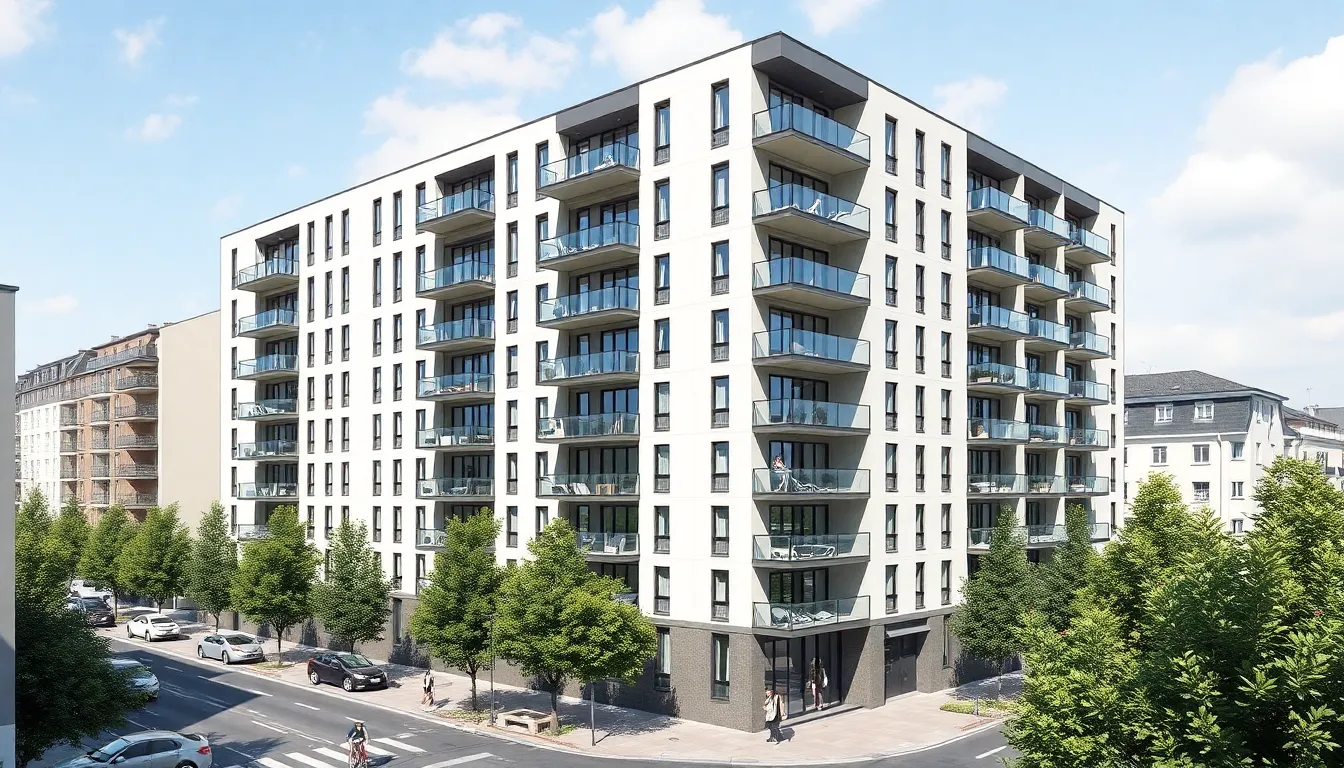Nestled between Belgium, Germany, and France, Luxembourg might just be the best-kept secret in Europe. With its charming villages and stunning countryside, it’s easy to get lost in its beauty. But before packing those bags and heading to this tiny grand duchy, it’s wise to check the price tag. Spoiler alert: living in Luxembourg can cost more than a fancy dinner in Paris, but hey, who wouldn’t pay a little extra for that fairy-tale lifestyle?
From housing and groceries to transportation and entertainment, the cost of living in Luxembourg can feel like a rollercoaster ride. But don’t worry—this article will break it down and help navigate the twists and turns. So buckle up and get ready to explore what it really takes to call this picturesque place home.
Table of Contents
ToggleOverview of Cost of Living in Luxembourg
Living in Luxembourg involves significant expenses. Housing prices often rank among the highest in Europe. In city centers, the average rent for a one-bedroom apartment can reach approximately €1,500 per month. Costs decrease slightly in suburban areas, yet affordability remains a challenge.
Groceries also contribute to the high cost of living. Typical monthly grocery expenses for one person average around €300. Basic items like milk, bread, and meat are generally pricier compared to nearby countries. Dining out adds another layer to the financial obligations, where a meal at a mid-range restaurant costs around €20 per person.
Transportation costs impact budgets as well. Public transport is efficient and widely used. Monthly public transport passes cost about €50. Owning a car incurs additional expenses, including fuel, insurance, and maintenance, further elevating the overall cost of living.
Monthly utility bills for an average apartment amount to about €200, covering electricity, heating, and water. Internet access adds another €40 on average. Additional leisure activities, such as gym memberships or cultural outings, may add €50 to €100 per month to personal expenses.
Understanding these costs offers valuable insight into budgeting for life in Luxembourg. Although the charm and quality of life appeal to many, living here demands financial preparedness. Planning ahead ensures thorough comprehension of the monetary commitments involved in this enchanting grand duchy.
Major Expenditure Categories

Luxembourg presents significant living expenses across various categories. Understanding these can help residents and newcomers manage their budgets effectively.
Housing Costs
Housing costs in Luxembourg rank among the highest in Europe. Renting a one-bedroom apartment in the city center averages around €1,500 per month. Finding accommodation outside the city can lower this cost, but options may still be limited. Home buyers face steep property prices, with the average cost per square meter reaching approximately €4,000. It’s essential to factor in additional fees such as property taxes and maintenance costs when considering housing.
Utilities and Internet
Utility bills in Luxembourg often total around €200 monthly for a standard apartment. This amount usually covers electricity, heating, cooling, water, and garbage services. Internet access adds approximately €40 per month to the budget. Residents may find utility costs vary based on usage levels and individual consumption habits. Staying informed about energy-saving practices can reduce expenses over time.
Transportation Expenses
Transportation expenses are another critical aspect of daily life in Luxembourg. Monthly public transport passes typically cost about €50, allowing access to buses, trams, and trains throughout the country. Residents who rely on personal vehicles incur additional costs, including fuel, insurance, and maintenance. Parking fees in urban areas can also impact monthly budgets. Overall, utilizing public transport often proves more economical than owning a car.
Food and Grocery Prices
Understanding food and grocery prices in Luxembourg is essential for budgeting. Both dining out and grocery shopping play significant roles in monthly expenses.
Dining Out
Eating out in Luxembourg can be expensive. A meal at a mid-range restaurant costs around €20 per person. Fast food options remain more affordable, typically between €8 and €12. Local specialties may tempt visitors and residents alike. Many restaurants feature seasonal menus, showcasing fresh ingredients. Dining out in Luxembourg reflects its cultural diversity, with various international cuisines available. Prices may increase at high-end establishments, where a three-course meal for two can reach €100. Residents often enjoy the social aspect of dining out, contributing to the overall cost of living.
Grocery Shopping
Grocery shopping in Luxembourg can strain budgets. Average expenses for one person amount to approximately €300 monthly. Basic items like milk, bread, and cheese generally cost more than in neighboring countries. A liter of milk averages €1, while a loaf of bread can range from €2 to €3. Fresh produce also sees higher prices, with fruits and vegetables costing more due to importation. Residents frequently shop at local markets or supermarkets for better deals. Discount grocery chains exist, providing more options for budget-conscious consumers. Overall, grocery prices significantly impact living expenses in Luxembourg.
Healthcare Costs
Healthcare in Luxembourg offers high-quality services, but costs reflect that quality. Basic health insurance covers essential medical services. Monthly premiums for statutory health insurance average around €150, depending on income.
Co-payments apply for doctor visits and specialist consultations. Standard fees usually include a €5 co-payment per consultation. Prescription medicines also incur costs, constituting 100% coverage up to a set maximum amount.
Private health insurance can supplement statutory coverage, which improves flexibility for patients. Many opt for private plans to reduce out-of-pocket expenses for services not fully covered. The cost of private health insurance varies; an average monthly premium can be around €200.
Dental care costs can escalate quickly. Regular check-ups might be covered, but procedures like fillings or crowns require up to 50% out-of-pocket payments. Average dental expenses, including preventive care, can reach €500 annually.
Long-term care presents additional considerations for families. Options include home care or institutionalization, with prices depending on the care level required. Monthly costs for home care services can range from €2,000 to €4,000.
It’s crucial for residents and newcomers to factor healthcare costs into their budgets accurately. While healthcare in Luxembourg maintains a high standard, understanding the financial responsibilities associated with it helps in planning effectively.
Education and Childcare Expenses
Education and childcare expenses in Luxembourg represent significant financial commitments for families. Parents can expect to pay around €1,000 monthly for full-time daycare services. Many choose nursery schools, which might charge between €500 and €1,200 monthly, depending on the child’s age and the school’s location.
International schools feature prominently in Luxembourg, particularly for expatriate families. Annual tuition fees for these institutions can range from €12,000 to €20,000, reflecting the diverse educational offerings. Public schools, while free, may not meet the language needs of all children, prompting parents to consider additional educational support.
Extracurricular activities also add to educational costs. Music lessons, sports clubs, and art classes typically cost between €50 and €150 per month. These expenses can accumulate quickly, particularly if children participate in multiple activities.
Additional costs arise from school supplies and uniforms. Families generally spend around €300 to €500 annually on these necessities, depending on the age and school requirements of their children. School outings or special events may incur extra charges, so budgeting for these occurrences is wise.
Understanding these expenses aids families in planning their budgets effectively. Recognizing that the quality of education in Luxembourg is high can justify the costs for many. Balancing educational aspirations with childcare needs requires careful consideration, especially when living in a country known for its high living expenses.
Living in Luxembourg offers a unique blend of charm and quality of life but comes with significant financial responsibilities. Understanding the high costs associated with housing, groceries, transportation, and healthcare is essential for anyone considering a move or extended stay.
With housing prices and everyday expenses surpassing those in many neighboring countries, effective budgeting becomes crucial. Whether it’s enjoying a meal out or managing educational costs for children, residents need to navigate these financial commitments carefully.
Despite the challenges, Luxembourg’s picturesque landscapes and vibrant culture make it an attractive destination for many. Those who plan wisely can enjoy all that this grand duchy has to offer while maintaining financial stability.






